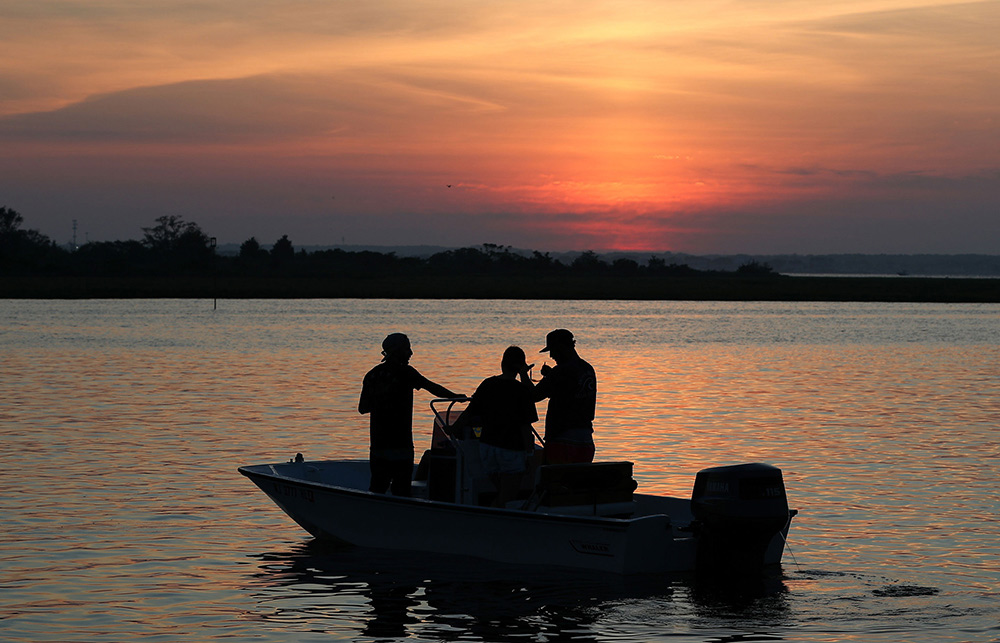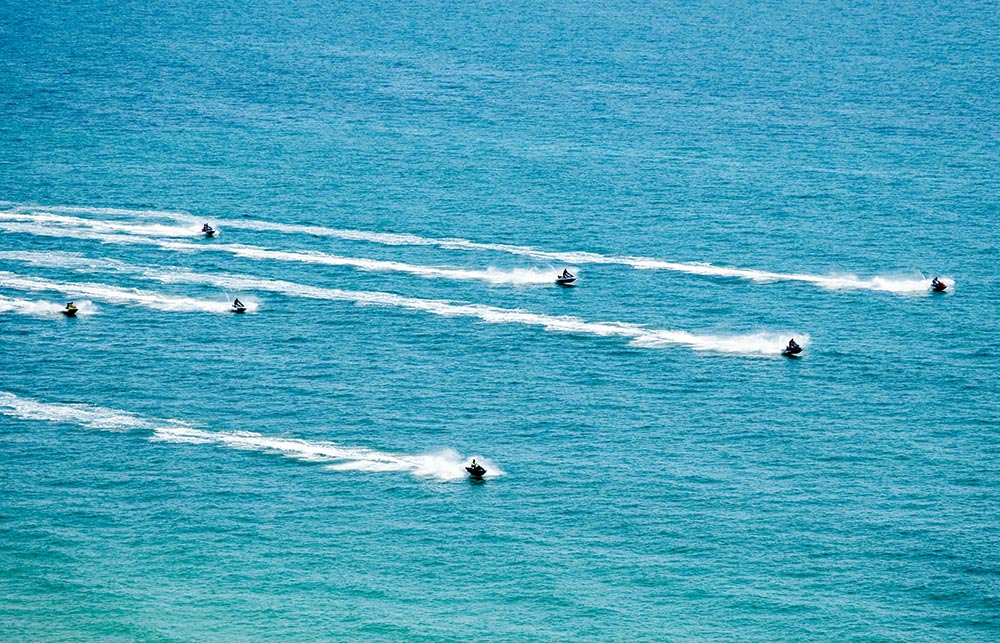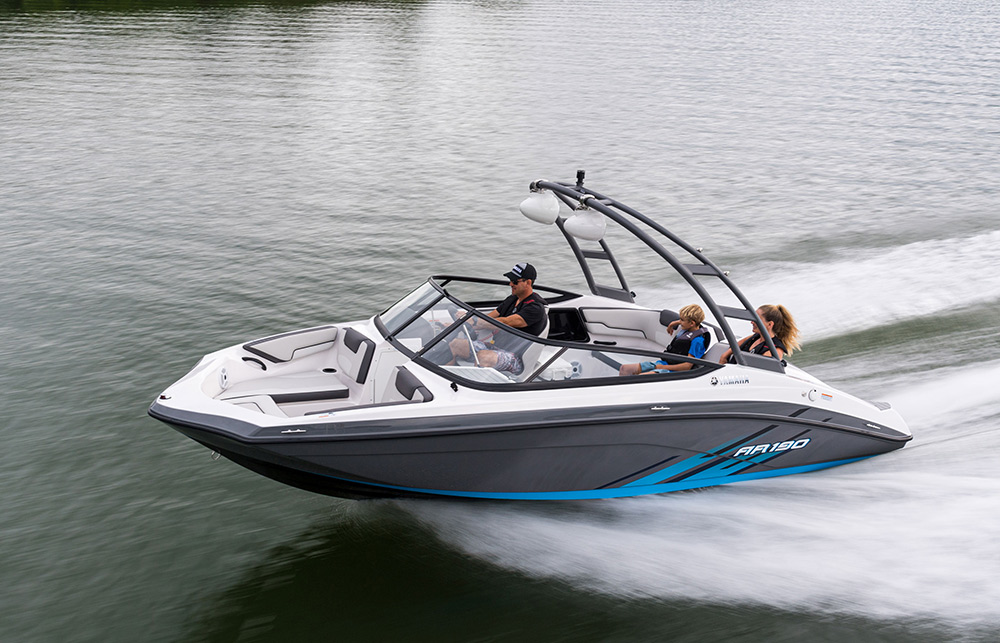澤西海岸的船塢空空蕩蕩,因為疫情而長期居家的人們蜂擁前往運河,、小溪和河流出游,,就像以前去迪士尼樂園或巴黎一樣,。

7月4日國慶節(jié)的周末,,我和好朋友戴夫開車經過新澤西州布里克鎮(zhèn)著名的船塢,這里是位于大西洋內陸半島上的小村莊,其實就在紐約時代廣場南邊70英里,。讓我震驚的是,,面前相當空曠,,能看到康斯托克游艇銷售和碼頭綜合大樓的一部分,,干涸的船塢里停著幾艘船,只有幾艘新船在售,。“戴夫,,這是不是說明,,疫情嚴重沖擊了水上運動?”我問道,?!澳阍陂_玩笑吧,?”戴夫反駁道?!岸煳野汛T诳邓雇锌耍恐芏歼^來,。當時到處都是新船,擠得人都走不動,。我的船下水后,6月回去看了一眼,,船塢里幾乎空了,。經理告訴我:‘全都賣完了,。’”
布里克鎮(zhèn)的劃船熱并非孤例,,從佛羅里達州的沿海水道到密蘇里州的奧扎克湖,,再到華盛頓的普吉特灣,生活方式的變化正席卷全美,。布里克鎮(zhèn)人口7.5萬,,河流和運河密布。很多人一直居住于此,,通勤到紐約市或費城上班,,還有很多人只在周末和暑假前往休假。此處一直很適合劃船,,布里克鎮(zhèn)成千上萬的富裕家庭住在水邊狹窄土地的大房子里,,水邊是一排排緊挨著的私人碼頭。隨著疫情爆發(fā),,人們對海上休閑越發(fā)渴望,。
“這里的人不去佛羅里達的主題公園,,孩子們不玩足球和籃球,我也取消了阿拉斯加的行程。”康斯托克的副總裁唐?迪澤爾說,,康斯托克是上世紀70年代初他家收購的產業(yè),,主要用雪松農場的木材造船,?!霸谶@里,如果不下水就很難賺錢,。人們都厭倦了家里的四面墻,。這是一種新認識,,旅行房車行業(yè)也一樣,。”他指出,,紐約和賓夕法尼亞州的“人口大量涌入”,,要么在布里克鎮(zhèn)買房子,,要么在避暑別墅工作?!叭藗兌加袝r間陪孩子一整天,所以紛紛選擇劃船,,這也是社交隔離期間能享受的最有趣的事了,?!钡蠞蔂栒f,?!拔覀冊谶@里發(fā)現了企業(yè)缺乏的增長動力,,即年輕,、首次嘗試的客戶激增,?!彼享椖恐饾u變成了因為疫情而被憋瘋的美國人的首選。
24歲的康拉德是我朋友戴夫的兒子,,工作是市場經理,他打算買17英尺長的新船,??道孪胭I自己的船,主要因為喜歡開父親的海釣艇去位于近處巴內特灣附近的水道F-Cove,,人們停好船,,既能跟旁邊船保持安全距離,還可以參與大型的浮動車尾聚會,。從退休人員到大學生,,各種人都在參與,還有些人放下救生橡皮艇,,這樣就能劃著船到處跟朋友打招呼,。
必須承認,,我并不是航海愛好者,對劃船的興趣完全為了研究因為疫情而繁榮起來的這個產業(yè),。我對航海興趣不大其實并不正常,,因為我從小喊父親“船長”,他是持有執(zhí)照的“水手長”,,一輩子在油輪上當大副,。回到陸地以后,,他把家里墻壁稱為“艙壁”,,把地板稱為“甲板”。他給我這個不喜歡船的孩子起了個綽號:“水手長,?!泵慨敱凰珠L質問時,船長就回答說:“松一松,,悠著點,。”他在評論某個人的理由不太靠譜時會說:“他的水手袋沒有打包好,?!?
總體來看,美國游艇業(yè)增長達到十多年來最高水平,。代表船只和船舶發(fā)動機制造商的美國國家海洋制造商協(xié)會的統(tǒng)計數據顯示,,經濟大衰退曾經重創(chuàng)休閑游艇業(yè),2006年和2007年的年銷售量超過30萬臺,,到2009年年中到2014年年中,,銷量跌至低點,僅為18萬艘左右,?!按笏ネ藢π袠I(yè)造成了嚴重打擊?!毙聺晌髦莺Q筚Q易協(xié)會執(zhí)行董事梅麗莎?丹科說,。“20年里減少了10萬艘注冊船只,,”下降幅度為40%,。隨著個人收入的強勁增長,股市上揚,,2019年美國銷售量逐漸回升至25萬艘左右,。
今年1月和2月,銷售數字在2019年的強勁水平基礎上繼續(xù)上升。隨后由于疫情導致的停產,,4月和5月銷售額下降了三分之一以上,,為每月1.7萬艘左右。5月交貨達到了2.8萬艘,,創(chuàng)下2007年11月以來最高紀錄,。熱門類別中,個人船艇(PWC)的銷售額創(chuàng)下月度新高,,6月個人船艇(PWC)同比猛增41%,5月噴氣艇銷量比去年高31%,?!颁N量已經企穩(wěn),現在都是新買家推動的增長機會,?!钡た普f。

推動潮流
從雅馬哈船艇騰飛的案例,,可以看出新吸引力和新客戶是如何推動休閑劃船的。雅馬哈船艇隸屬美國雅馬哈發(fā)動機公司,,旗下生產和銷售兩條產品線都因為劃船,、個人船只和噴氣艇市場的復蘇而受益匪淺。負責銷售和市場營銷的布萊恩?塞蒂已經在雅馬哈工作了22年,。他解釋說,,雅馬哈在佐治亞州和田納西州的兩家工廠生產WaveRunner品牌的個人船艇,也在美國銷售雅馬哈噴氣艇,。這兩條生產線都針對首次購船者,。WaveRunner是一種開放式的船,通常長度為11英尺,,更類似水上摩托車,,能承載一到三個人,坐在一個座位上,。駕駛者可以在海浪飛沫中疾馳,,后面還能拖著充氣墊,,帶孩子們沖浪。WaveRunner的價格從6000美元到15000美元不等,。
而噴氣艇封閉式船只,,體型則大得多,長度為19到27英尺,,船內裝有內型發(fā)動機,,還裝有從音響系統(tǒng)到淋浴和水上運動塔等多種便利設施。售價從3萬元到13萬元不等,?!安还苁荳aveRunners和噴氣艇,均為多功能設計,,非常適合新的休閑需求,。”塞蒂說,?!翱梢猿薟aveRunners和噴氣艇釣魚,也可以沖浪或滑行,;如果是噴氣艇,,可以花一個星期在長島灣或查爾斯湖巡游,拜訪朋友,,探尋美味,。”平均而言,,最近這兩款產品的買家主要是40多歲左右的人,。“通常在收入達到最高水平,,有了孩子,,買了一兩輛車和一套房子之后購買,”塞蒂說,。

多年來,雅馬哈在個人船艇和噴氣艇領域占據的市場份額遙遙領先,??傮w來看,相關類別占到動力船總銷量三分之一左右。個人船艇市場每年約80000艘,,雅馬哈的WaveRunner占42%的份額,,噴氣艇業(yè)務則占十分之九,6000艘里占5500艘,。自2014年以來,,船艇銷售量以每年5%左右的速度增長,超過全行業(yè)水平,?!敖衲甑拈_局不錯,”塞蒂說,?!?月和2月銷售非常強勁。隨后,,3月下旬銷量大幅下滑。當時經銷商還不知道之后會失業(yè)60天,?!叭僬J為雅馬哈應該為客戶提供深入援助,“撐過未來60到90天,,不至于讓一整年的努力付諸東流,。”
雅馬哈的支持分為三部分,。首先,,為3月和4月的廣告預算提供全額資金,確保經銷商不會停掉廣告,?!拔覀兂袚藦V告費?!比僬f,。其次,雅馬哈為經銷商的客戶提供無息融資,,船只180天零首付,,WaveRunners系列產品90天零首付?!皳蔚较奶炀秃昧?。”他告訴他們,。第三,,雅馬哈免除了“地板”費,即之前向經銷商收取船塢和展廳展出未售出船只的費用。
與此同時,,雅馬哈也在支持經銷商繼續(xù)爭取客戶,,如今疫情改變了整個銷售過程,之前是人與人見面實體銷售,,現在變?yōu)樵诰€銷售,。塞蒂說:“以前的方式是,1月或2月參加大型船展,,看到喜歡的船之后親自坐在駕駛臺旁體驗,,然后跟地區(qū)經銷商碰面。到了春天,,打電話或拜訪經銷商下單,。”他說,,很多客戶會要求買之前試駕兜風,。經銷商們擔心,原來客戶都喜歡跟銷售人員面對面,,而現在銷售點大多已經關門,,買家會因此減少?!盃I銷方式和顧客的購買方式完全變了,。”他說,?!拔覀儙徒涗N商利用Zoom銷售,提供視頻介紹,,還使用電子文檔簽署合同,。突然間,顧客們對網上購物也很滿意,?!?
業(yè)內所稱的“旺季”,即2019年10月至今年6月銷量大增期間,,WaveRunner的銷量從2.1萬輛躍升至2.6萬輛,,較2018年至2019年同期增長23%,也創(chuàng)下新紀錄,。在噴氣艇方面,,從10月到6月,已經售出3630艘,,比之前一季增加了1047架,,增幅達29%,。
在塞蒂看來,盡管3月出現下跌,,本季銷售仍然遠超上一季,,這證明了上升趨勢(與作者不同)相當穩(wěn)健并不“暈船”?!拔覀円恢备裢庵匾暿状钨徺I者,,但現在買家越來越多,包括30多歲到40多歲的人,?!彼f?!斑@是新生需求,,也是根本性的改變。船只行業(yè)將保持多年上升趨勢,,因為只要喜歡了水上休閑,,就會一直喜歡?!彼A測,,在剛買第一艘船的家庭里,孩子們都會迷上劃船的感覺,。今年夏天,很多孩子每天釣魚沖浪,,而不是徒步露營或乘游輪旅行,。“疫情期間,,劃船是最棒的居家度假方式,。”塞蒂說,。
他說,,年輕的買家發(fā)現劃船確實不錯,能在水上玩更多時間,。父母不再只是周末去湖邊或海濱別墅,,整個春天和夏天都能住在水邊居家工作?!?5歲的人可以花3萬美元買艘19英尺的船,,一周劃三四天,一次6小時,?!比僬f,。“如果跟之前花4000美元買職業(yè)體育賽事兩個賽季的門票相比,,其實挺劃算,。”
我還采訪了經銷商,,他們都證實了塞蒂的判斷,,現在網絡購物確實占據了主導地位?!?0天內網站流量增長了1000%,。”MarineMax的Ozarks分公司總經理戴爾?勞說,,MarineMax公司股票剛達到14年來高點,。勞指出,銷售額比去年增長了15%,,完全由電商業(yè)務帶動:“現在人們看到視頻后,,打電話給銷售人員說:‘多介紹點這艘船的信息?!缓笕藗冞€沒有試駕,,網購的數量就已經創(chuàng)下紀錄?!?
勞補充說,,“沒有人想到會出現創(chuàng)紀錄的復蘇?!笔状钨徺I的人非常多,,他很受鼓舞,但并不確定繁榮能持續(xù)多久,?!罢l知道人們能旅行之后會怎樣?”他說,??邓雇锌说牡蠞蔂柡軜酚^?!拔覀冃枰木褪切迈r血液,,新買家進入填補衰老的一代?!彼f,。“現實恰是如此,。之前人們的安排都跟著孩子的日程走,?!彼a充說?!艾F在,,孩子都沒有事做,所以大家有很多時間劃船,。我們賣的就是填補空閑的快樂,。”聽起來真是有趣,,我真的很期待乘坐戴夫的船出海玩一趟,。到時候我要站著駕駛臺前,手握臺克利雞尾酒,,講述那一次我父親的船遭遇颶風,,海上波濤洶涌,馬戲團的大象受驚從甲板一側滑到另一邊,,差點把船弄沉的故事,。(財富中文網)
譯者:Feb
澤西海岸的船塢空空蕩蕩,因為疫情而長期居家的人們蜂擁前往運河,、小溪和河流出游,,就像以前去迪士尼樂園或巴黎一樣。
7月4日國慶節(jié)的周末,,我和好朋友戴夫開車經過新澤西州布里克鎮(zhèn)著名的船塢,,這里是位于大西洋內陸半島上的小村莊,其實就在紐約時代廣場南邊70英里,。讓我震驚的是,,面前相當空曠,能看到康斯托克游艇銷售和碼頭綜合大樓的一部分,,干涸的船塢里停著幾艘船,只有幾艘新船在售,?!按鞣颍@是不是說明,,疫情嚴重沖擊了水上運動,?”我問道?!澳阍陂_玩笑吧,?”戴夫反駁道?!岸煳野汛T诳邓雇锌?,每周都過來,。當時到處都是新船,擠得人都走不動,。我的船下水后,,6月回去看了一眼,船塢里幾乎空了,。經理告訴我:‘全都賣完了,。’”
布里克鎮(zhèn)的劃船熱并非孤例,,從佛羅里達州的沿海水道到密蘇里州的奧扎克湖,,再到華盛頓的普吉特灣,生活方式的變化正席卷全美,。布里克鎮(zhèn)人口7.5萬,,河流和運河密布。很多人一直居住于此,,通勤到紐約市或費城上班,,還有很多人只在周末和暑假前往休假。此處一直很適合劃船,,布里克鎮(zhèn)成千上萬的富裕家庭住在水邊狹窄土地的大房子里,,水邊是一排排緊挨著的私人碼頭。隨著疫情爆發(fā),,人們對海上休閑越發(fā)渴望,。
“這里的人不去佛羅里達的主題公園,孩子們不玩足球和籃球,,我也取消了阿拉斯加的行程,。”康斯托克的副總裁唐?迪澤爾說,,康斯托克是上世紀70年代初他家收購的產業(yè),,主要用雪松農場的木材造船?!霸谶@里,,如果不下水就很難賺錢。人們都厭倦了家里的四面墻,。這是一種新認識,,旅行房車行業(yè)也一樣?!彼赋?,紐約和賓夕法尼亞州的“人口大量涌入”,要么在布里克鎮(zhèn)買房子,,要么在避暑別墅工作,?!叭藗兌加袝r間陪孩子一整天,所以紛紛選擇劃船,,這也是社交隔離期間能享受的最有趣的事了,。”迪澤爾說,?!拔覀冊谶@里發(fā)現了企業(yè)缺乏的增長動力,即年輕,、首次嘗試的客戶激增,。”水上項目逐漸變成了因為疫情而被憋瘋的美國人的首選,。
24歲的康拉德是我朋友戴夫的兒子,,工作是市場經理,他打算買17英尺長的新船,??道孪胭I自己的船,主要因為喜歡開父親的海釣艇去位于近處巴內特灣附近的水道F-Cove,,人們停好船,,既能跟旁邊船保持安全距離,還可以參與大型的浮動車尾聚會,。從退休人員到大學生,,各種人都在參與,還有些人放下救生橡皮艇,,這樣就能劃著船到處跟朋友打招呼,。
必須承認,我并不是航海愛好者,,對劃船的興趣完全為了研究因為疫情而繁榮起來的這個產業(yè),。我對航海興趣不大其實并不正常,因為我從小喊父親“船長”,,他是持有執(zhí)照的“水手長”,,一輩子在油輪上當大副?;氐疥懙匾院螅鸭依飰Ρ诜Q為“艙壁”,,把地板稱為“甲板”,。他給我這個不喜歡船的孩子起了個綽號:“水手長?!泵慨敱凰珠L質問時,,船長就回答說:“松一松,,悠著點?!彼谠u論某個人的理由不太靠譜時會說:“他的水手袋沒有打包好,。”
總體來看,,美國游艇業(yè)增長達到十多年來最高水平,。代表船只和船舶發(fā)動機制造商的美國國家海洋制造商協(xié)會的統(tǒng)計數據顯示,經濟大衰退曾經重創(chuàng)休閑游艇業(yè),,2006年和2007年的年銷售量超過30萬臺,,到2009年年中到2014年年中,銷量跌至低點,,僅為18萬艘左右,。“大衰退對行業(yè)造成了嚴重打擊,?!毙聺晌髦莺Q筚Q易協(xié)會執(zhí)行董事梅麗莎?丹科說?!?0年里減少了10萬艘注冊船只,,”下降幅度為40%。隨著個人收入的強勁增長,,股市上揚,,2019年美國銷售量逐漸回升至25萬艘左右。
今年1月和2月,,銷售數字在2019年的強勁水平基礎上繼續(xù)上升,。隨后由于疫情導致的停產,4月和5月銷售額下降了三分之一以上,,為每月1.7萬艘左右,。5月交貨達到了2.8萬艘,創(chuàng)下2007年11月以來最高紀錄,。熱門類別中,,個人船艇(PWC)的銷售額創(chuàng)下月度新高,6月個人船艇(PWC)同比猛增41%,,5月噴氣艇銷量比去年高31%,。“銷量已經企穩(wěn),,現在都是新買家推動的增長機會,。”丹科說。
邁阿密海灘,,個人艇在比賽,。“沒有人想到會出現創(chuàng)紀錄的復蘇,?!币晃唤涗N商談到銷售時說?!罢l知道人們能旅行之后會怎樣,?我認為漲勢不會持續(xù)多年?!?
推動潮流
從雅馬哈船艇騰飛的案例,,可以看出新吸引力和新客戶是如何推動休閑劃船的。雅馬哈船艇隸屬美國雅馬哈發(fā)動機公司,,旗下生產和銷售兩條產品線都因為劃船,、個人船只和噴氣艇市場的復蘇而受益匪淺。負責銷售和市場營銷的布萊恩?塞蒂已經在雅馬哈工作了22年,。他解釋說,,雅馬哈在佐治亞州和田納西州的兩家工廠生產WaveRunner品牌的個人船艇,也在美國銷售雅馬哈噴氣艇,。這兩條生產線都針對首次購船者,。WaveRunner是一種開放式的船,通常長度為11英尺,,更類似水上摩托車,,能承載一到三個人,坐在一個座位上,。駕駛者可以在海浪飛沫中疾馳,,后面還能拖著充氣墊,帶孩子們沖浪,。WaveRunner的價格從6000美元到15000美元不等,。
而噴氣艇封閉式船只,體型則大得多,,長度為19到27英尺,,船內裝有內型發(fā)動機,還裝有從音響系統(tǒng)到淋浴和水上運動塔等多種便利設施,。售價從3萬元到13萬元不等,。“不管是WaveRunners和噴氣艇,,均為多功能設計,,非常適合新的休閑需求,。”塞蒂說,。“可以乘WaveRunners和噴氣艇釣魚,,也可以沖浪或滑行,;如果是噴氣艇,可以花一個星期在長島灣或查爾斯湖巡游,,拜訪朋友,,探尋美味?!逼骄?,最近這兩款產品的買家主要是40多歲左右的人?!巴ǔT谑杖脒_到最高水平,,有了孩子,買了一兩輛車和一套房子之后購買,,”塞蒂說,。
2021款雅馬哈AR-190。雅馬哈船艇公司是日本雅馬哈發(fā)動機株式會社的子公司,,生產和銷售兩條產品線都因為劃船,、個人船只和噴氣艇市場復蘇而受益匪淺。
多年來,,雅馬哈在個人船艇和噴氣艇領域占據的市場份額遙遙領先,。總體來看,,相關類別占到動力船總銷量三分之一左右,。個人船艇市場每年約80000艘,雅馬哈的WaveRunner占42%的份額,,噴氣艇業(yè)務則占十分之九,,6000艘里占5500艘。自2014年以來,,船艇銷售量以每年5%左右的速度增長,,超過全行業(yè)水平?!敖衲甑拈_局不錯,,”塞蒂說?!?月和2月銷售非常強勁,。隨后,3月下旬銷量大幅下滑。當時經銷商還不知道之后會失業(yè)60天,?!叭僬J為雅馬哈應該為客戶提供深入援助,“撐過未來60到90天,,不至于讓一整年的努力付諸東流,。”
雅馬哈的支持分為三部分,。首先,,為3月和4月的廣告預算提供全額資金,確保經銷商不會停掉廣告,?!拔覀兂袚藦V告費?!比僬f,。其次,雅馬哈為經銷商的客戶提供無息融資,,船只180天零首付,,WaveRunners系列產品90天零首付?!皳蔚较奶炀秃昧?。”他告訴他們,。第三,,雅馬哈免除了“地板”費,即之前向經銷商收取船塢和展廳展出未售出船只的費用,。
與此同時,,雅馬哈也在支持經銷商繼續(xù)爭取客戶,如今疫情改變了整個銷售過程,,之前是人與人見面實體銷售,,現在變?yōu)樵诰€銷售。塞蒂說:“以前的方式是,,1月或2月參加大型船展,,看到喜歡的船之后親自坐在駕駛臺旁體驗,然后跟地區(qū)經銷商碰面,。到了春天,,打電話或拜訪經銷商下單?!彼f,,很多客戶會要求買之前試駕兜風,。經銷商們擔心,原來客戶都喜歡跟銷售人員面對面,,而現在銷售點大多已經關門,,買家會因此減少?!盃I銷方式和顧客的購買方式完全變了,。”他說,。“我們幫經銷商利用Zoom銷售,,提供視頻介紹,,還使用電子文檔簽署合同。突然間,,顧客們對網上購物也很滿意,。”
業(yè)內所稱的“旺季”,,即2019年10月至今年6月銷量大增期間,,WaveRunner的銷量從2.1萬輛躍升至2.6萬輛,較2018年至2019年同期增長23%,,也創(chuàng)下新紀錄,。在噴氣艇方面,從10月到6月,,已經售出3630艘,,比之前一季增加了1047架,增幅達29%,。
在塞蒂看來,,盡管3月出現下跌,本季銷售仍然遠超上一季,,這證明了上升趨勢(與作者不同)相當穩(wěn)健并不“暈船”,。“我們一直格外重視首次購買者,,但現在買家越來越多,,包括30多歲到40多歲的人?!彼f,。“這是新生需求,,也是根本性的改變,。船只行業(yè)將保持多年上升趨勢,,因為只要喜歡了水上休閑,就會一直喜歡,?!彼A測,在剛買第一艘船的家庭里,,孩子們都會迷上劃船的感覺,。今年夏天,很多孩子每天釣魚沖浪,,而不是徒步露營或乘游輪旅行,。“疫情期間,,劃船是最棒的居家度假方式,。”塞蒂說,。
他說,,年輕的買家發(fā)現劃船確實不錯,能在水上玩更多時間,。父母不再只是周末去湖邊或海濱別墅,,整個春天和夏天都能住在水邊居家工作?!?5歲的人可以花3萬美元買艘19英尺的船,,一周劃三四天,一次6小時,?!比僬f?!叭绻盎?000美元買職業(yè)體育賽事兩個賽季的門票相比,,其實挺劃算?!?
我還采訪了經銷商,,他們都證實了塞蒂的判斷,現在網絡購物確實占據了主導地位,?!?0天內網站流量增長了1000%?!盡arineMax的Ozarks分公司總經理戴爾?勞說,,MarineMax公司股票剛達到14年來高點。勞指出,,銷售額比去年增長了15%,,完全由電商業(yè)務帶動:“現在人們看到視頻后,,打電話給銷售人員說:‘多介紹點這艘船的信息?!缓笕藗冞€沒有試駕,,網購的數量就已經創(chuàng)下紀錄?!?
勞補充說,,“沒有人想到會出現創(chuàng)紀錄的復蘇?!笔状钨徺I的人非常多,,他很受鼓舞,但并不確定繁榮能持續(xù)多久,?!罢l知道人們能旅行之后會怎樣?”他說,。康斯托克的迪澤爾很樂觀,?!拔覀冃枰木褪切迈r血液,新買家進入填補衰老的一代,?!彼f?!艾F實恰是如此,。之前人們的安排都跟著孩子的日程走?!彼a充說,。“現在,,孩子都沒有事做,,所以大家有很多時間劃船。我們賣的就是填補空閑的快樂,?!甭犉饋碚媸怯腥ぃ艺娴暮芷诖俗鞣虻拇龊M嬉惶?。到時候我要站著駕駛臺前,,手握臺克利雞尾酒,講述那一次我父親的船遭遇颶風,,海上波濤洶涌,,馬戲團的大象受驚從甲板一側滑到另一邊,,差點把船弄沉的故事。(財富中文網)
譯者:Feb
The Jersey Shore’s empty boatyards bear witness that locked-down leisure-seekers are making outings on our canals, creeks, and rivers the new jaunts to Disney World or Paris.
Over July Fourth weekend, my great friend Dave and I were driving past a boatyard that’s a landmark in Brick Township, N.J., a hamlet on a peninsula just inland from the Atlantic, and around 70 miles south of Times Square. I was shocked to see a mainly barren expanse––part of the creek-front Comstock Yacht Sales & Marina complex––dotted with just a couple of boats in dry dock, and featuring only a few new craft for sale. “Dave, does this mean the pandemic is killing boating?” I inquired. “Are you kidding?” riposted Dave. “I keep my boat at Comstock in the winter, and I visited every week. The place was so chock-full of new boats you couldn’t walk between them. After I put my Blackfin in the water, I go back in June, and the yard’s almost empty. The manager tells me, ‘Everything just sold out.’”
The boating surge in Brick Township illustrates a shift in lifestyles that’s sweeping America from Florida’s Intracoastal Waterway to Missouri’s Lake of the Ozarks to Washington’s Puget Sound. Brick Township, population 75,000, is honeycombed with rivers and canals. Many of its residents live there full-time and commute to work in New York City or Philadelphia, while a large portion come down on weekends and for summer vacations. This was always a boating haven—thousands of Brick Township’s mainly affluent families live on the water in large homes clustered on narrow lots, their private docks lined up cheek by jowl. But the COVID-19 outbreak has taken the craving for leisure on the seas to a whole new level.
“People from here aren’t going to Florida theme parks; there’s no soccer or basketball for the kids; I canceled a cruise to Alaska,” says Don Ditzel, vice president of Comstock, a property his family bought in the early 1970s to build vessels from wood harvested from their cedar farm. “You can't swing a purse without hitting the water here. People are tired of the four walls of their houses. It’s an awakening, the same thing that’s happening with RVs.” He notes “a huge influx of people” from New York and Pennsylvania who are either buying houses in Brick Township or working full-time from their summer homes there. “They have all day to do things with their kids, so they’ve turned to boating, which is about the most fun you can have while social distancing,” says Ditzel. “We’re seeing just the growth impetus the business has been lacking, a jump in younger, first-time customers.” The water is becoming the chief refuge for stir-crazy Americans.
My friend David’s son Conrad, a 24-year-old marketing manager, is shopping for a new, 17-foot fishing boat. Conrad wants his own craft in part because he enjoys taking his dad’s Blackfin Sportfisherman to F-Cove, a waterway off the nearby Barnegat Bay where people beach their boats and join in a big floating tailgate party while typically keeping a safe distance from the vessel parked alongside. The boaters, who encompass everyone from retirees to college kids, even drop rubber rafts so that they can row around greeting friends.
This writer must confess that he’s anything but nautical, and that his interest in boating arises strictly from studying the industries prospering from how Americans are coping with the pandemic. That I’ve never found my sea legs is surprising, since my father, whom I called “Skipper,” was a licensed "master mariner" who spent his career as a first mate on oil tankers, and while on land, called our home’s walls “the bulkhead” and the floors “the deck.” He dubbed this boat-shy offspring, "the bosun." When challenged by the bosun, Skipper would respond, “Slack away easy.” A typical description of someone whose reasoning he found less than sound: “He’s not shipping with a full seabag.”
Overall, America’s boating business is showing the strongest growth in over a decade. The Great Recession hammered leisure craft, pummeling units sold from over 300,000 a year in 2006 and 2007 to a low of around 180,000 from mid-2009 to mid-2014, according to statistics from the National Marine Manufacturers Association that represents makers of boats and marine engines. "The Great Recession hit the industry hard," says Melissa Danko, executive director of the Marine Trades Association of New Jersey. “We went down by 100,000 registered boats in two decades,” a drop of 40%. As personal incomes began a strong run, and the stock market ascended, national sales gradually recovered to the 250,000 range in 2019.
In January and February, the numbers continued their rise from strong 2019 levels. Then, the COVID-driven shutdown hammered sales by over one-third in April and May to around 17,000 a month. Talk about a V––deliveries took a moonshot in May to around 28,000, the best number since November of 2007. In hot categories, sales hit record monthly highs, with personal watercraft, or PWC, jumping 41% in June over last year, and for May, jet boats beating last year’s number by 31%. “We’d stabilized, but what we’re seeing now is a growth opportunity driven by new buyers,” says Danko.
Powering a trend
The takeoff at Yamaha WaterCraft offers an onboard view of the fresh allure and new customers powering leisure boating. Yamaha WaterCraft, a division of Yamaha Motor Corp. USA, manufactures and sells the two product lines that have benefited most from the romance with boating, personal watercraft and jet boats. Heading sales and marketing is Bryan Seti, a 22-year Yamaha veteran. Yamaha makes its PWCs under the WaveRunner brand, and its Yamaha jet boats sold in the U.S., he explains, at two plants in Georgia and Tennessee. The two lines are both aimed at first-time buyers. The WaverRunners are open vessels, typically 11 feet in length, that in some ways resemble motorcycles on the water, carrying one to three people, all riding on a single seat. The drivers love speeding across the foam, often towing kids on inflatables for tubing. WaveRunner prices run from $6,000 to $15,000.
Jet boats are much bigger, enclosed craft measuring 19 to 27 feet, featuring internal-propulsion motors built into the hull of the boat, and lots of amenities from sound systems to showers and water sports towers. Prices range from $30,000 to $130,000. “Both the WaveRunners and jet boats are versatile, so they’re ideally suited to the new quest for leisure,” says Seti. "You can fish with WaveRunners and jet boats; use them for tubing or wakesurfing; and for jet boats, spend a week cruising the Long Island Sound or Lake Charles to visit friends and stop at restaurants.” On average, buyers until recently have mainly been in their mid-to late forties for both products. “People usually buy after they’ve hit peak earnings years, had kids, and bought a car or two, and a house,” says Seti.
For years, Yamaha has held far and away top market share in both PWCs and jet boats. All told, those categories account for around one-third of all powerboat sales. Yamaha’s WaveRunner holds 42% of the approximately 80,000 annual PWC market, and sells nine in 10, or 5,500 of 6,000 new jet boats that hit the water each year. Since 2014, unit sales have been growing at around 5% a year, outpacing the overall industry. "This year got off to a great start," says Seti. “January and February were very strong months. Then sales fell sharply in late March. Dealers we sell to didn’t know if they’d be out of work in 60 days.” Seti reckoned that Yamaha needed to provide extensive aid to its customers “as a bridge for the next 60 to 90 days so that a whole year didn’t get wiped out.”
Yamaha’s support came in three parts. First, it made sure dealers didn’t stop running ads by covering 100% of their advertising budgets for March and April. “We picked up the tab on ads,” Seti remarks. Second, Yamaha provided the dealers’ customers with financing at 0% interest and no down payment for 180 days for boats and 90 days for WaveRunners. “The summer’s on us,” he told them. Third, Yamaha waived “flooring” fees, the interest it charges dealers for unsold boats on display in their yards and showrooms.
At the same time Yamaha’s backing encouraged dealers to keep reaching for customers, the pandemic was transforming the entire sales process from person to person and kicking the hull to digital. Says Seti: “The old way was, you come to a big boat show in January or February, see one you love and sit at the controls, and meet the dealer in your area selling that model. And in the spring, call or visit the dealer to put in an order.” Many customers, he says, demanded that the dealer take them for a spin before buying. Dealers fretted that customers traditionally liked to meet face to face with a salesperson, and because their offices were mostly closed, buyers would dwindle. “Then, the way they marketed and the way customers purchased totally changed,” he says. “We helped dealers get a lot better at selling over Zoom and providing video tours, and using e-docs for signing the contracts. Suddenly, customers became comfortable buying online.”
For what the industry calls “the season,” the peak months from October 2019 to June of this year, sales of WaveRunners have jumped from 21,000 to 26,000, marking an increase of 23% over the same period spanning 2018 to 2019 and establishing a new record. As for jet boats, its dealers have sold 3,630 units from October through June, 1,047 or 29% more than in the previous season.
For Seti, that this season beats last season by a wide margin, despite the fall in March, proves that the uptrend (unlike the author) has sea legs. “We always focused on first-time buyers, but now we’re seeing a lot more of them, including people in their late-thirties to mid-forties,” he says. “That’s fresh demand. This is a fundamental change. It will spur boating for many years, because once the water life is in your DNA, it stays there.” He predicts that the kids whose families just bought their first craft will get hooked on the romance of boating. Many children will go fishing and surfing every day this summer instead of trekking to camp or going on cruises. "In the pandemic, boating is ultimate staycation," says Seti.
Younger buyer, he says, are finding that boating is a good deal because they now have a lot more time to spend on the water. Instead of visiting the lake or shore house only on weekends, the parents are living there all spring and summer, and working from home. “Someone who’s 35 can pay $30,000 for a 19-footer and take it out three or four days a week, six hours at a time," says Seti. "That’s a bargain when you consider that they used to spend $4,000 for two season tickets for pro sporting events.”
I also interviewed dealers, and they confirmed Seti’s view that Internet shopping has taken charge––in a flash. “Our web traffic is up 1,000% in 90 days,” says Dale Law, general manager at the Lake of the Ozarks branch of MarineMax, a publicly traded boat seller whose stock just hit a 14-year high. Law notes that sales are running 15% ahead of last year, and it’s all about e-commerce: “People watch videos then call a salesperson and say, ‘Tell me more about the boat.’ But then they’re buying in record numbers online, without even test-driving.”
Law adds that “no one could have predicted this record resurgence.” He’s encouraged by a surge in first-time buyers, but remains unsure how long the boom will last. “Who knows what will happen when people get back to traveling?” he says. Ditzel of Comstock, back in Brick Township, is upbeat. “What we needed was new blood to make up for the boaters who are aging out faster than new buyers,” he says. “And that’s happening. It used to be that what people did was dominated by their kids’ schedules,” he adds. “Now, their kids are unscheduled, and they have lots of time for boating. We’re selling fun to fill that time.” Sounds so good I’m actually looking forward to an outing on Dave’s Blackfin. I’ll be the one on the fly bridge holding a daiquiri, and telling tales about the time a cargo of circus elephants, bowled over in a hurricane and careening across the deck, nearly capsized Skipper’s tanker into a boiling sea.






